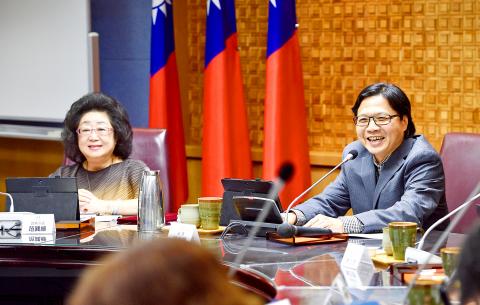The Ministry of Education yesterday instructed National Taiwan University (NTU) to re-elect a president from the five finalists of the previous election — including NTU finance professor Kuan Chung-ming (管中閔), whose election was rejected by the ministry in May — on the condition that Taiwan Mobile Co (台灣大哥大) vice president Richard Tsai (蔡明興) is barred from voting to avoid a conflict of interest.
The ministry is not asking the university to launch an election from square one, but only to “redo the step found to be flawed,” Minister of Education Yeh Jiunn-rong (葉俊榮) told a news conference at the ministry in Taipei.
The committee on Jan. 5 elected Kuan to be NTU president and he was originally scheduled to take office on Feb. 1, but the ministry on May 4 refused to approve his election on the grounds that there was a conflict of interest in the election process, as Kuan allegedly did not tell the committee that he was an independent member of Taiwan Mobile’s board of directors, even though Tsai was on the election committee.

Photo: Peter Lo, Taipei Times
The university, a group of NTU students and Kuan have each filed an administrative appeal requesting that the ministry honor the election results and appoint him.
A report issued by the Judicial Yuan on Aug. 16 concluded that Kuan had contravened the Act Governing the Appointment of Educators (教育人員任用條例) in his capacity at Taiwan Mobile, and that he and Tsai had each failed to disclose the conflict of interest prior to the election.
When the ministry requested a re-election in May, it did not specify how it should be conducted and the summer break has made it difficult for the election committee to meet to resolve the controversy, Yeh said.
“Now that school has begun, things should be different. The committee should convene a meeting to address the concerns raised by the ministry and the Control Yuan, and officially respond to them,” he said.
The committee must first determine whether to remove Tsai or have him refrain from voting, and then relaunch the final round of the election with the same five candidates, he said.
The candidates were Kuan, Institute of Atomic and Molecular Sciences director Chou Mei-yin (周美吟), Administrative Affairs vice president and physics professor Chang Ching-ray (張慶瑞), Graduate Institute of Networking and Multimedia professor Chen Ming-hsien (陳銘憲) and history professor Chen Jo-shui (陳弱水).
If NTU refuses to cooperate, the ministry would formally respond to the administrative appeal by Oct. 3, he said, adding that he hopes to avoid a lawsuit, because it might affect the university’s stability.
“Only by ensuring fairness can presidential elections be considered legitimate. I hope that there will be no more hesitation from either side, because the nation’s administrative procedures, which are essential to the rule of law, must not be further compromised,” Yeh said.

Seventy percent of middle and elementary schools now conduct English classes entirely in English, the Ministry of Education said, as it encourages schools nationwide to adopt this practice Minister of Education (MOE) Cheng Ying-yao (鄭英耀) is scheduled to present a report on the government’s bilingual education policy to the Legislative Yuan’s Education and Culture Committee today. The report would outline strategies aimed at expanding access to education, reducing regional disparities and improving talent cultivation. Implementation of bilingual education policies has varied across local governments, occasionally drawing public criticism. For example, some schools have required teachers of non-English subjects to pass English proficiency

‘FORM OF PROTEST’: The German Institute Taipei said it was ‘shocked’ to see Nazi symbolism used in connection with political aims as it condemned the incident Sung Chien-liang (宋建樑), who led efforts to recall Democratic Progressive Party (DPP) Legislator Lee Kun-cheng (李坤城), was released on bail of NT$80,000 yesterday amid an outcry over a Nazi armband he wore to questioning the night before. Sung arrived at the New Taipei City District Prosecutors’ Office for questioning in a recall petition forgery case on Tuesday night wearing a red armband bearing a swastika, carrying a copy of Adolf Hitler’s Mein Kampf and giving a Nazi salute. Sung left the building at 1:15am without the armband and apparently covering the book with a coat. This is a serious international scandal and Chinese

TRADE: The premier pledged safeguards on ‘Made in Taiwan’ labeling, anti-dumping measures and stricter export controls to strengthen its position in trade talks Products labeled “made in Taiwan” must be genuinely made in Taiwan, Premier Cho Jung-tai (卓榮泰) said yesterday, vowing to enforce strict safeguards against “origin laundering” and initiate anti-dumping investigations to prevent China dumping its products in Taiwan. Cho made the remarks in a discussion session with representatives from industries in Kaohsiung. In response to the US government’s recent announcement of “reciprocal” tariffs on its trading partners, President William Lai (賴清德) and Cho last week began a series of consultations with industry leaders nationwide to gather feedback and address concerns. Taiwanese and US officials held a videoconference on Friday evening to discuss the

PERSONAL DATA: The implicated KMT members allegedly compiled their petitions by copying names from party lists without the consent of the people concerned Judicial authorities searched six locations yesterday and questioned six people, including one elderly Chinese Nationalist Party (KMT) member and five KMT Youth League associates, about alleged signature forgery and fraud relating to their recall efforts against two Democratic Progressive Party (DPP) legislators. After launching a probe into alleged signature forgery and related fraud in the KMT’s recall effort, prosecutors received a number of complaints, including about one petition that had 1,748 signatures of voters whose family members said they had already passed away, and also voters who said they did not approve the use of their name, Taipei Deputy Chief Prosecutor